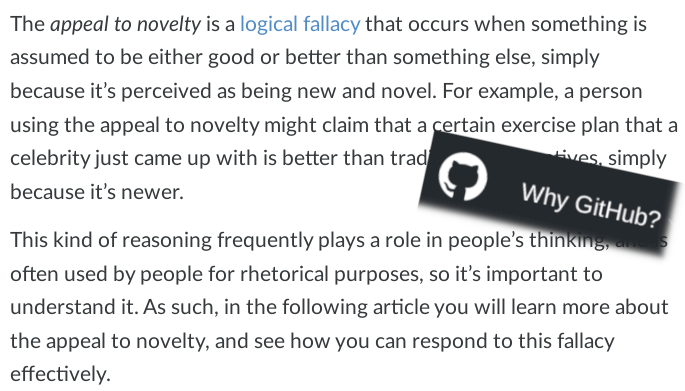

From "The Appeal to Novelty Fallacy: Why New Isn’t Necessarily Better" (pattern now used by Microsoft to push Linux into GitHub, i.e. Microsoft)
THE general population typically seeks popularity (how it's measured depends on a person's environment, but to many the yardstick is nowadays "number of Facebook 'friends' and 'likes' etc."); nobody wants to "stay behind" and advertising constantly attempts to compel people to get rid of "old things", then buy "new things" (the "smart" stuff, the cutting-edge nonsense with all the latest patents). We see this in "5G" and increasingly in listening+tracking devices often referred to as 'smartphones' (because they're largely for intelligence and sometimes they can also be used as phones).
"We see this in "5G" and increasingly in listening+tracking devices often referred to as 'smartphones' (because they're largely for intelligence and sometimes they can also be used as phones)."More people need to learn to say "no!"
"No" to whatever corporations trot out the door and are unable to actually justify (more e-waste, more expenditures and newer patents that artificially inflate prices -- not to be conflated with worth).
This extends well beyond software freedom; environmentalists too, for instance, ought to talk about it. There are people out there who replace their "old" car with something brand new every now and then (even if the functional aspect of the "old" car is totally fine) because many people in workplaces or extended families judge one's "success" by the vehicles that get one around. Yes, vehicles. Plural. Because to 'prove' one's high status the garage may turn into somewhat of a wardrobe, with different kinds of "rides" for all sorts of "occasions".
"Shaming tactics are incredibly effective, especially within large and indoctrinated groups (peer pressure), when the target is a career-climbing insecure person with social aspirations (class)."At the moment, accelerated a great deal by COVID-19, the "war on cash" goes up a notch. People who use "dumb" payments are stigmatised as dirty and primitive (or not "smart", hence "dumb"). They're presumed to be incapable of opening a bank account or having an "app" and they're ridiculed as "conspiracy theorists" if they speak about their privacy. Last month we were turned away for demanding or insisting on payments using cash (for merely ordering a meal) on at least 3 occasions; they're all smug about it, treating customers like lepers if those customers do not wish to be identified.

"People who choose to reject so-called 'novelty' aren't backwards or foolish; it's perfectly possible that they have legitimate concerns about the direction in which things go, mainly to benefit authoritarian governments and corporations (giving them vast powers) at the expense of the general population."It's perfectly possible that systemd -- like Windows/NT -- will be deprecated (Google still rejects it, but we don't call Google "neckbeards", do we?) and when people realise tyrannical 'benefits' of digital payments (surveillance of all transactions/interactions) they will reintroduce physical bartering systems (digital currencies/payments can be made anonymous, e.g. GNU Taler). Newer is not always better; bloat is never better; obsolescence of the old has all the burden on those looking to rationalise it. People who choose to reject so-called 'novelty' aren't backwards or foolish; it's perfectly possible that they have legitimate concerns about the direction in which things go, mainly to benefit authoritarian governments and corporations (giving them vast powers) at the expense of the general population. Such people should expect to be mocked by corporate media, controlled if not wholly owned by those same governments and corporations looking to increase their breadth of control.
Don't always be shamed into being "novel" or easily become "smart".
Are you being pressured to put a "smart" meter inside the home (one's house, private space)? Things to say to energy suppliers/representatives who push those "smart" meters: 1) you only need 30 seconds in my house a few times a year, not 24/7. Send a person to get a reading. 2) what's so smart about those anyway? Who controls them? 3) sign my contract, as I will not sign yours. $1000 fine for each privacy violation, $10,000 fine for a security breach. ⬆